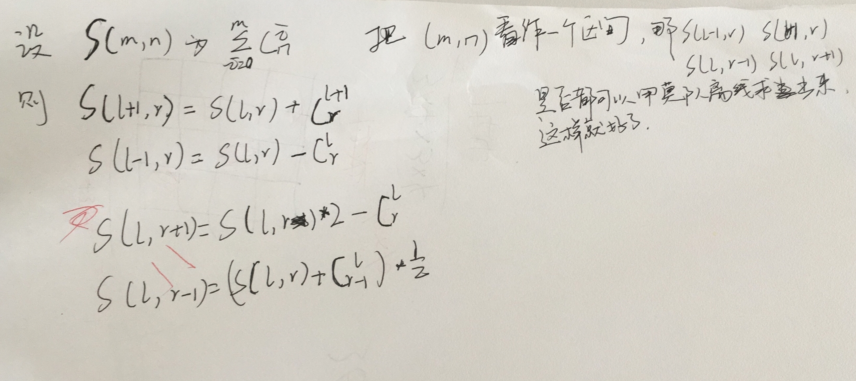Problem Description
There are
n apples on a tree, numbered from 1 to n.
Count the number of ways to pick at most m apples.
Count the number of ways to pick at most m apples.
Input
The first line of the input contains an integer
T (1≤T≤105) denoting the number of test cases.
Each test case consists of one line with two integers n,m (1≤m≤n≤105).
Each test case consists of one line with two integers n,m (1≤m≤n≤105).
Output
For each test case, print an integer representing the number of ways modulo
109+7.
Sample Input
2 5 2 1000 500
Sample Output
16 924129523
Source
解析:

#include <iostream> #include <cstdio> #include <sstream> #include <cstring> #include <map> #include <cctype> #include <set> #include <vector> #include <stack> #include <queue> #include <algorithm> #include <cmath> #include <bitset> #define rap(i, a, n) for(int i=a; i<=n; i++) #define rep(i, a, n) for(int i=a; i<n; i++) #define lap(i, a, n) for(int i=n; i>=a; i--) #define lep(i, a, n) for(int i=n; i>a; i--) #define rd(a) scanf("%d", &a) #define rlld(a) scanf("%lld", &a) #define rc(a) scanf("%c", &a) #define rs(a) scanf("%s", a) #define pd(a) printf("%d\n", a); #define plld(a) printf("%lld\n", a); #define pc(a) printf("%c\n", a); #define ps(a) printf("%s\n", a); #define LL long long #define ULL unsigned long long #define Pair pair<int, int> #define mem(a, b) memset(a, b, sizeof(a)) #define _ ios_base::sync_with_stdio(0),cin.tie(0) //freopen("1.txt", "r", stdin); using namespace std; const int maxn = 1e5 + 100, INF = 0x7fffffff, LL_INF = 0x7fffffffffffffff; const int MOD = 1e9+7; LL n, m, ans; LL up[maxn], down[maxn], pos[maxn], inc[maxn], inv[maxn]; struct node { LL l, r; int id; }Node[maxn]; bool cmp(node a, node b) { return pos[a.l] == pos[b.l] ? (a.r < b.r) : (a.l < b.l); } LL qp(LL a, LL b) { LL res = 1; while(b) { if(b & 1) res = res * a % MOD; a = a * a % MOD; b >>= 1; } return res; } void init() { up[0] = 1; down[0] = 1; for(int i=1; i<maxn; i++) { up[i] = up[i-1] * i % MOD; down[i] = qp(up[i], MOD - 2) % MOD; } } LL C(LL n, LL m) { if(n < m) return 0; return up[n] * down[n-m] % MOD * down[m] % MOD; } int main() { init(); int block = sqrt(100000); for(int i=1; i<=100000; i++) pos[i] = (i-1)/block + 1; int T; rd(T); for(int i=1; i<=T; i++) { rlld(Node[i].r), rlld(Node[i].l); Node[i].id = i; } sort(Node + 1, Node + T + 1, cmp); ans = 2; int tmp = qp(2, MOD - 2); for(int i=1, l=1, r=1; i<=T; i++) { for(; r < Node[i].r; r++) ans = (2 * ans - C(r, l) + MOD) % MOD; for(; r > Node[i].r; r--) ans = (ans + C(r-1, l)) * tmp % MOD; for(; l < Node[i].l; l++) ans = (ans + C(r, l+1)) % MOD; for(; l > Node[i].l; l--) ans = (ans - C(r, l) + MOD) % MOD; if(Node[i].l == Node[i].r) { inc[Node[i].id] = 1; } inc[Node[i].id] = ans; } for(int i=1; i<=T; i++) printf("%lld\n", inc[i]); return 0; }